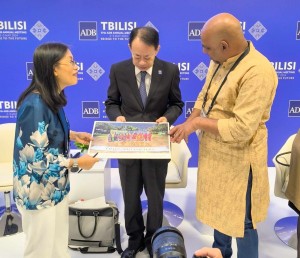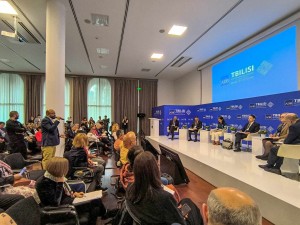Tbilisi, Georgia May 4, 2024 (Issuewire.com) - In a bold stance against the Asian Development Bank (ADB), the NGO Forum network and its allies from across the globe unite to challenge the bank's policies and projects, highlighting its detrimental impact on communities, environments, and civic spaces. As the ADB convenes its 57th Annual Meeting, CSOs emphasize the urgent need for accountability and reform within the institution.
The ongoing oppression of civic space in Georgia serves as a poignant backdrop to the broader critique of the ADB's actions. Amidst oppressive laws targeting civil society in countries like Kyrgyzstan, Tajikistan, and Uzbekistan, and the shrinking civil society space in Mongolia, Vietnam, India, and Bangladesh, the ADB's role cannot be overlooked.
CSOs demand that the ADB uphold the highest standards of Environmental and Social Safeguarding (ESF), rooted in internationally agreed-upon human rights, labor, and environmental conventions. However, the Draft ESF released in October 2023 fails to meet these standards.
The lack of transparency and accountability in the ESF consultation process raises serious concerns. Despite two years of engagement, CSOs have not seen how their inputs were incorporated into the draft policy. The ESF's failure to commit to doing 'No Harm' underscores the ADB's negligence towards environmental and social safeguarding.
Furthermore, the ESF's ambiguous language and omission of critical processes like Environmental Impact Assessments and Social Impact Assessments raise alarms about its effectiveness in addressing project-related harms. CSOs reject the ESF draft and demand its immediate overhaul with binding requirements.
The ADB's support for coal and fossil gas projects contradicts its climate commitments. The Energy Transition Mechanism (ETM) fails to ensure the decommissioning of coal projects or prevent their repurposing into other harmful ventures. CSOs denounce the ADB's inaction in phasing out fossil fuel support and call for the closure of loopholes allowing coal financing.
Moreover, the ADB's disregard for human rights, labor rights, and gender considerations further undermines its credibility. CSOs demand the integration of a human rights-based approach into the ESF, aligning with global frameworks and principles.
As the ADB conducts its safeguards review process, CSOs call for robust, just, rights-based policies with mechanisms to hold borrowers and the private sector accountable. Transparency, inclusivity, and community participation must guide ADB's decision-making processes.
In a direct message to the ADB President and Director Generals, the Forum network and its allies urge them to prioritize the public interest and accountability. The ADB must heed the calls of affected communities, environmental defenders, and human rights advocates. ADB’s actions have real consequences on the lives and livelihoods of people across Asia and the Pacific. It is time for the Bank to prioritize people over profit, safeguard the environment, and uphold human rights.
Quotes from NGO Forum on ADB network members and allies [Please don't forget to put the name and the organization after the quote -
The shrinking civil society space is a recent trend in the region where Russia tries to reassert its power. The laws in Kyrgyzstan, Kazakhstan, and now in Georgia undermine different freedoms and rights, including the right to freedom of association and expression, recognized and widely integrated into ADB policies and standards. It threatens ADB's goals for 2030 for sustainable development, climate resilience, and prosperity. The laws have a chilling effect not only on media outlets and civil society organizations but also drastically worsen the investment climate, increase corruption, deteriorate governance indicators, significantly raise corruption risks, impact the sustainability of investments, and corrode business. Therefore, the response from ADB should be systemic to halt or reduce its impacts to ensure meaningful participation, freedom of assembly, and expression. For example, as the public sector in Georgia is a large recipient of ADB funds, the Bank should suspend all new funding to the public sector until the decision to pass the draft law is overturned, as it increases the risk of projects failing to meet performance standards by limiting opportunities for meaningful stakeholder participation.
- Manana Kochladze, CEE Bankwatch
At the 57th ADB Annual Meeting, we are still seeking environmental and social justice for the Tanahu Hydro Project Affected Indigenous Magar Communities, who have been pursuing justice since 2019 through the dispute resolution process with no avail. Civil society groups from Manipur are left vulnerable with no assurances that raising concerns about the Imphal road project will not lead to backlash and risk of harm. The ADB's failed delivery of the SPS 2009 remains a reality in 2024, and we are witnessing a rush to change the architecture of the policy instead of addressing the bank’s implementation failures of the SPS. Our analysis of this ESF W paper reveals a policy that seeks to dilute binding regulations from the SPS 2009 standards through the Mitigation Hierarchy approach, allowing borrowers to bypass EIAs and SIAs prior to board approval for high and medium-risk projects. This places the environment and local communities at direct risk from all ADB project operations. The ADB's new Gender-blind ESF, in our assessment, actually does an excellent job in safeguarding, especially ADB Bank Officials and its borrowers, just not the people or the planet.
- Rayyan Hassan, NGO Forum on ADB
In good faith we have invested two years in the ESF Consultations with the ADB’s Office of Safeguards (OSFG), but the opacity regarding the integration of CSO inputs and demands into the resulting draft policy paper is disappointing, also alarming. Despite our persistent engagement and sincere detailed input, the absence of a disclosed matrix leaves us in the dark, as to which of our comments have been considered and which have been disregarded and why! What little faith we may have liked to repose in the ADB has been lost with this lack of transparency regarding the exclusion of our inputs throughout the Phase 2 Consultation process.
Most importantly, for the communities we represent, the ESF's vision fails to commit to the fundamental principle of doing 'No Harm' through ADB operations. This is a shocking disregard for the very purpose of environmental and social safeguarding right from the inception of the draft ESF W paper. It underscores the extent to which our concerns and recommendations have been blatantly ignored.
- Vidya Dinker, Growthwatch, India
ADB's continued financing of fossil gas and large hydropower projects contradicts the global shift towards renewable energy. LNG-based power plants, despite being ten times more expensive than renewables in many Asian countries, still receive ADB funding. We demand a decisive stance: ADB must exit gas and revise its Energy Policy to prioritize a green transition devoid of fossil fuels and environmentally destructive projects. Liquid hydrogen, CCS, and Waste-to-Energy technologies, also receiving ADB financing, have proven costly and ineffective in reducing carbon emissions. It's time for ADB to redirect public funds towards genuine solutions for a sustainable future.
- Hasan Mehedi, CLEAN (Coastal Livelihood and Environmental Action Network)
This draft safeguards policy does little to rectify the black hole that is ADB's financial intermediary lending. Communities harmed by ADB investments have a right to seek remedy, but there can be no accountability if we can’t see where the money is really coming from. The Bank’s safeguards for intermediary lending need drastic improvement, to ensure full transparency about its involvement in all projects it funds - including clear disclosure of ADB financing at project sites and in community consultations.
-Kate Geary, Co-Director, Recourse
Almost half of ADB’s projects — 46% — have triggered involuntary displacement between 2015 and 2020. This means up to 1 million people were likely driven away from their homes, communities, and livelihoods. All without adequate compensation or solid environmental and social impact assessment. For a development bank to spend public money on poverty alleviation, this is unacceptable. ADB must do better than that, and fast.
- Dr. Nora Sausmikat, Urgewald, Germany
What has been set in 2009 as a forward looking safeguard policy for people and planet is turning into an unbreakable shield of protection for industry polluters .Instead of keeping at pace with the recent amendments of these MEAs on the standards and targets to curb the most harmful pollutants to guide the Bank and its borrowers, the draft ESF has omitted previous references to the Stockholm Convention on Persistent Organic Pollutants, the Montreal Protocol on Substances that Deplete the Ozone Layer and the Basel Convention on the Control of Transboundary Movements of Hazardous Waste and their Disposal. Moreover, it also has ignored the Minamata Convention that governs mercury which is a known byproduct of incinerator processes and ongoing talks for a Global Plastics Treaty. Instead of aligning with international law, the Bank relies on non-existent country mechanisms and capacities to govern pollution and offers pathways for continued pollution for industries through offsetting mechanisms The Bank’s adherence to just transition remains empty as well as the draft remains mum to the rights of informal workers in which developing countries rely tremendously for managing waste resources. The draft is regressive at every level in protecting the environment and preventing pollution.
- Mayang Azurn, Global Alliance for Incinerator Alternatives, Asia Pacific
For media inquiries, please contact:
Dennis Paule
09456741746
Jen Derillo
+639175088841
**NGO Forum on ADB is an Asian-led network of civil society organizations (CSOs) that has been monitoring the projects, programs, and policies of the Asian Development Bank (ADB) and the Asian Infrastructure Investment Bank (AIIB).
For more information visit: https://www.forum-adb.org/
Media Contact
NGO Forum On ADB dennis@forum-adb.org https://www.forum-adb.org










